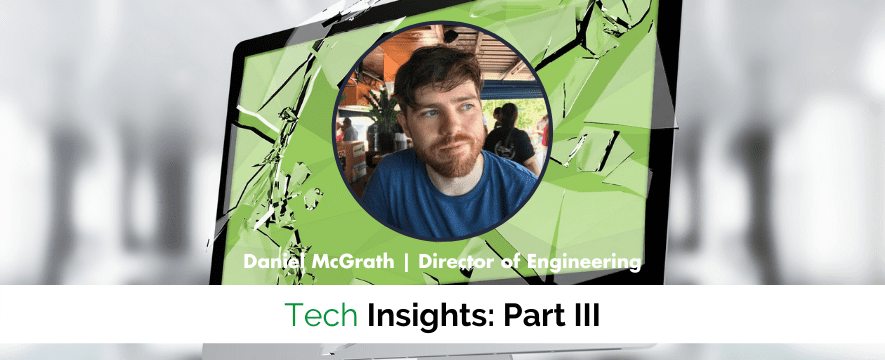I’ve worked with startups in the DC metro area since 2013 – long before Amazon announced plans to build HQ2 here in Crystal City. After reading predictions from outside sources about the impact HQ2 will have in the area, I decided to reach out to local startup executives to find out how local business leaders actually feel about Amazon expanding in the area.
The consensus: Amazon’s new HQ2 in Virginia will shake up the tech industry in DC. Startups will struggle to compete with Amazon in resources, particularly when it comes to retaining and hiring talent. However, the influx of engineering talent will become a boon to the DC startup market.
How Amazon HQ2 will help (and hurt) the DC startup market

Many people don’t realize that Amazon Web Services has been located in the D.C. metro area for years. In that respect, it’s more appropriate to say Amazon is expanding, rather than moving, into the area. That gives us some insight into what to expect.
Full disclosure: my company, hatch IT, occasionally partners with Amazon to set up local tech events for engineers. We’re a little biased because we’ve seen firsthand how Amazon benefits the local engineering community.
That said, let’s not beat around the bush. Startups will suffer a bit in Amazon HQ2’s first year. They’ll lose talented software engineers to Amazon, because many engineers will want to have Amazon on their resume. As a company that works with DC area startups to expand their product and engineering teams, we’ve had front-row seats to the Amazon expansion.
I spoke with Peter Scott, the co-founder, COO, and CFO of DivvyCloud, to see how he felt about HQ2 coming to the area. DivvyCloud is one of the area’s rapidly growing VC-backed tech startups. Their enterprise product helps companies get the most out of the cloud, while reducing costs and maintaining security and compliance. Peter was optimistic about Amazon HQ’s impact on the tech scene. He explained that Amazon will attract a different type of engineer than small startups.
Some local engineers might want to work for “the man” and will likely jump ship to work at Amazon. But, Peter added that this type of engineer is already likely to be working at larger, more established companies like Capital One. In fact, D.C. startups have been competing on compensation and resources with heavyweights like Capital One for years.
“The types of people who are attracted to working at a growth stage startup are not typically people who will want to go work at a place like Amazon.” – Peter Scott, co-founder, COO, and CFO at DivvyCloud
Peter pointed out that Amazon will cause an influx of talent in the area, which will benefit small startups. People will move where there are more employment opportunities. He sees Amazon HQ2 as especially beneficial for cloud startups, like DivvyCloud, that work at the intersection of cloud security and compliance. Furthermore, startups and businesses will move into the area, attracted by the prospect of new and ancillary sales channels.
At the same time, it’s currently not entirely clear what exact jobs Amazon will be filling out. Given the location, it’s possible Amazon will look for tech talent with federal government experience. In that case, companies like Leidos and CACI may face stiff competition.
The biggest danger for startups will be restricted stock units (RSUs). By offering RSUs, Amazon can encourage engineers to stay longer – leave early and you’ll forfeit stock options. But Peter explained that many engineers won’t want to be kept on a leash. Some engineers will head to Amazon thinking it’s “flashy,” and then realize it’s a big corporation. Those engineers may head back into the startup market.
I also spoke with Mike Grove, founder and SVP of Engineering and Product at Stardog, a local startup building a popular knowledge graph platform. He suggested that Amazon’s HQ2 may create a “vacuum effect pulling people out of government jobs, stalled startups, and probably getting more than their fair share of the graduates coming out of the top notch universities in the area.” However, he also sees HQ2 as a boon for startups. He expects engineers to work there for a few years and leave with a lot of valuable knowledge and experience.
“Then the best thing will happen. Many of those people, instead of going back into government jobs or the other giants in the area (don’t forget Microsoft, Oracle and others have offices here), they will start their own startups. I think this will be the single biggest impact. In a couple of years, instead of the tech here being mostly government and cybersecurity, there will be the beginning of a vibrant startup ecosystem that will make everything about the tech scene in this area for the better.” – Mike Grove, Founder and SVP of Engineering and Product at Stardog
Finally, to get Baltimore’s perspective, I spoke with Craig Connell. Craig is CTO and SVP of Engineering at STAQ, an NYC-based ad-tech startup that recently opened an office in Baltimore. Craig, too, didn’t see Amazon HQ2 as a threat. Instead, he emphasized the importance of remote work. Companies that are willing to adapt won’t face a serious existential challenge from Amazon. Craig explained that:
“With the influx of people into the area, Amazon HQ2 may not impact Baltimore as much. Businesses further from the new HQ will be less impacted. However, businesses are finding themselves looking at more remote employees anyway, because they’re feeling a pinch locally from competition in developer jobs and salary demands that are way in excess of what seems justified.” – Craig Connell, CTO and SVP of Engineering at STAQ
We’ve seen salary ranges for software engineers in the area rise aggressively since Amazon announced that it was moving into town, but we can’t say if that is directly tied to Amazon coming in. We believe it’s a direct correlation with the increased demand for engineers in general, and with a limited talent pool of product engineers in the DC, Maryland, Virginia area.
How startups can remain competitive in the battle for talent

AWS has operated in the area for years, and we’ve already seen a couple of our customers lose talent to Amazon. We saw one local startup lose a chief executive to Amazon because they weren’t willing to offer remote work and other perks that could have made them competitive.
Small startups have had to compete with established businesses for years. DC can be a competitive market with bad traffic and a competitive talent marketplace. The arrival of Amazon’s HQ2 won’t change that. Instead, it will further illustrate an ongoing trend: the startups that come out on top with be the ones that know how to play to their strengths and compete on areas other than compensation.
Even if a company can’t compete with Amazon’s salary, perks, and reputation, they can compensate in other areas that are becoming more and more attractive to engineers and employees. Competition against Amazon HQ2 highlights trends that are already occurring in the local startup ecosystem: to survive, startups need to offer remote work opportunities, competitive benefits, and cultures that empower engineers.
Work/Life Balance (Telecommuting)
The DC metro area is in desperate need of more open telecommuting policies. The traffic is awful, which will only get worse when Amazon fills out in Crystal City. Forward-thinking employers will get ahead of it now and start offering remote days to their teams. DC’s employers should use remote work as an incentive to sell to new hires and retain their best talent.
Benefits:
Employers can offer more competitive benefits to their employees. Startups are often known to offer benefits that appeal to younger, single employees. For example, they might cover 100% of an individual’s healthcare, but not offer coverage for dependents. That may need to change to cater to a more mature market.
Opportunity to Innovate:
Small businesses and startups always appeal to engineers because they can offer more opportunities to innovate, impact the product, and define the company culture. Smaller businesses can sell talent on the opportunity they offer to innovate more rapidly with a nimble startup environment than that of a larger corporation like Amazon. There will always be engineers who prefer to be the big fish in a little pond rather than being a little fish in an Amazon river.
Mike Grove explained it this way:
“Like I said, the kinds of people who want to work at a place like Stardog won’t see the allure in Amazon. But with that said, I think it does make it more important as we grow to strengthen and maintain the kind of culture that makes us a great place to work – even as we scale, not only providing some of the fast paced, put your stamp on things feel that early stage startups have – but also maintaining the family atmosphere that really makes people buy in to the mission.” – Mike Grove, Founder and SVP of Engineering and Product at Stardog
Craig Connell recalled the time he lost a candidate to Amazon. The candidate had been in the final stages of the interview process but left for a position at Amazon due to the company’s reputation and attractive compensation package. He recommends that companies follow a similar approach to the one DC-based startups typically use when competing with federal jobs:
“Have other incentives to offer instead of getting into a compensation bidding war with a behemoth Amazon. What you’ll find at the smaller companies like STAQ and others – you’ll find yourself in an opportunity to innovate at a speed more rapidly than at a larger company like Amazon. People you win over are the ones that are at larger companies currently and want to work with a nimbler startup environment.” – Craig Connell, CTO and SVP of Engineering at STAQ
After working with startups and technical founders in the DC, Maryland, Virginia area for the past seven years, I don’t see Amazon HQ2 as a threat to the local startup ecosystem. In fact, Amazon might help level the playing field. It will draw tech talent in from government jobs, large companies, and areas outside of D.C., creating a pool of experienced product engineers and new startups.





